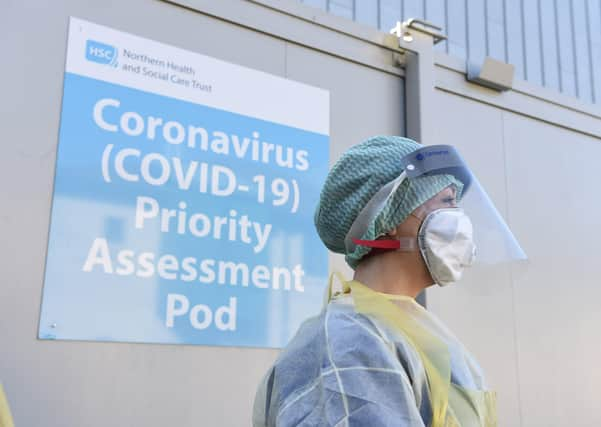Coronavirus: NI doctors and nurses know the risk – but they are determined, says senior medic


Dr George Gardiner, consultant in intensive care medicine and clinical director for intensive care at Belfast City Hospital and the Mater Hospital, said that his colleagues were “stoically” preparing for what was to come.
Dr Gardiner, who has been involved in preparations to treat people in intensive care units when the worst of the pandemic hits, told the News Letter that Northern Ireland appears to be about two to three weeks behind the situation in London, where hospitals are already struggling to deal with the volume of Covid-19 patients.
Advertisement
Hide AdAdvertisement
Hide AdThat means that Northern Ireland has extra time to prepare for what is coming, and may also receive more benefit from the UK-wide shutdown measures which the government implemented on Monday night.
Dr Gardiner said: “Everyone is really concentrating on training our colleagues to come and help us. We’re training surgeons and doctors and nurses form all sorts of other disciplines – everyone is in no doubt they will play a part.
“Obviously people are anxious; they’re anxious about their own health. But there’s a steely determination among people on the front line that this is the biggest challenge we’ve ever faced and we will face it stoically.”
As the News Letter reported yesterday, Northern Ireland has far fewer ventilators per capita than other major developed countries – there is one ventilator for every 10,614 people in Northern Ireland in comparison to one for every 3,769 people in the Republic of Ireland.
Advertisement
Hide AdAdvertisement
Hide AdThe number of ventilators is being increased – the existing 139 are being supplemented with another 40 by next week and then an additional 100 at some future point.
However, Dr Gardiner stressed that “putting someone on a ventilator is not that simple” and requires highly specialised staff.
He said that critical care nursing and other specialisms involved in intensive care require fine attention to detail and “that is what has got us our success in intensive care in recent years”.
He said that Northern Ireland’s hospitals, which have cancelled much of their normal work to prepare for the coming surge in Covid-19 cases, were “using the downtime to train people as best we can”.
Advertisement
Hide AdAdvertisement
Hide AdHe said that there is “incredible human effort going in to try to prepare people. The incidence of infection among health workers seems to be high and death rate among nursing staff seems significant, yet people are doing their jobs despite their concerns and we’re certainly well ahead in our preparations.
“We’ve been forewarned by London’s experience and we will throw everything at it.”
Stormont’s Department of Health is operating on the basis that in a reasonable worst case scenario – where the public do not heed government advice on hand-washing and staying at home – 80% of the population will be infected, with 121,000 people requiring hospitalisation, 10,600 people requiring critical care and about 15,200 people dying.
Dr Gardiner, who said that he and his teams were also working on the basis of the Stormont scenario – even though they hope that the situation is far less severe – stressed that if the worst case scenario happens then “no society anywhere in the world could cope”.